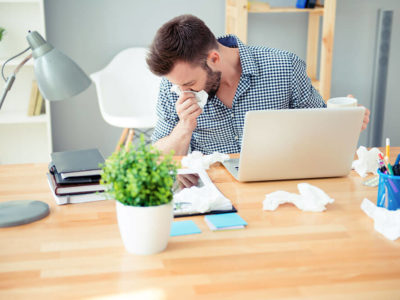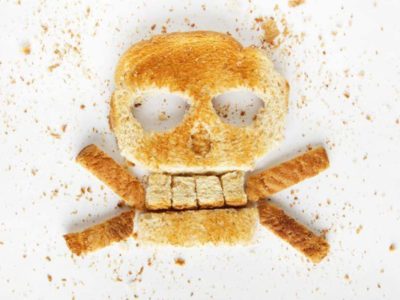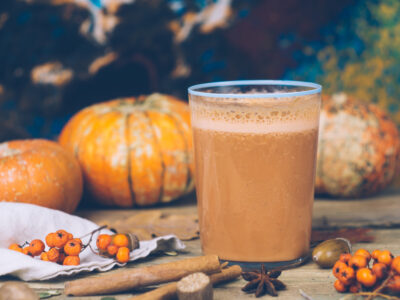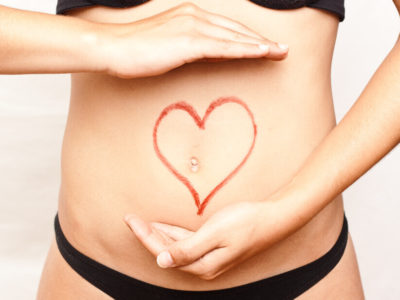Table of Contents[Hide][Show]
- What Is Bloating?
How to Get Rid of Bloating+−
- Be Aware of Trigger Foods
- Is Gluten Bad For You? Let’s Find Out!
- Choose the Right Type of Fiber
- Eat Mindfully
- Exercise (Lightly) After Eating
- Balance Your Gut Microbiome
- Other Things You Can Do to Prevent or Get Rid of Bloating
- 5 Easy and Healthy Fall Recipes That Won’t Cause Bloat
- 10 Foods To Add To Your Microbiome Diet
- Prebiotics for a Healthy Gut… and a Healthy You!
“Ugh, I feel so bloated!”
It’s an incredibly common lament—and with good reason. As many as 25% of healthy people experience occasional bloating.
But, what exactly is bloating?
Let’s take a look at the most common causes of bloating and, more importantly, what you can do to ease current symptoms and prevent them from recurring.
What Is Bloating?
Put simply, bloating is the feeling of having a full, tight abdomen. During a bloating episode, your stomach may feel like it’s filled with pressure. These feelings can range from mild discomfort to extremely painful.
Other symptoms may include:
- A gurgling sound in your abdomen, as gasses move around
- Burping or flatulence
- Discomfort or even pain in your abdomen
And for about half of the people who complain of bloating, their abdomen may even appear swollen (distended).
The Main Causes of Bloating
Bloating can be brought on by many different issues.
By far, the most common cause of bloating is excess gas trapped in your belly.
Now, gas is a normal byproduct of digestion. Everyone has gas in their abdomen at various points in the digestive process.
Bloating doesn’t happen when you have gas in your system; it occurs when you have excess gas.
But what causes that excess gas? And what else can cause bloating?
Let’s take a look at the most common causes of bloating.
Eating Habits
If you’re constantly asking yourself, “Why am I bloated after eating,” your eating habits might be allowing excess gas to enter your belly.
Speed is the biggest culprit.
Eating or drinking too fast increases the amount of air you swallow. This extra air gets trapped in your digestive system, leading to bloating.
Carbonated beverages and chewing gum can also lead to excess air in your stomach.
For the most part, this air will be expelled quickly, through burping, before it reaches your intestines.
Food Intolerances
Not just how you eat, but what you eat, can also be the cause of post-meal bloating.
Food intolerances, sensitivities, and allergies can make it difficult, or even impossible, for your body to digest certain ingredients.
This can then cause your digestive system to create more gas than usual, leading to bloating.
Some of the most common food intolerances that lead to bloating include:
- Fructose
- Gluten
- Lactose
These are notoriously difficult for your body to process. In fact, your body may have trouble digesting these substances even if you aren’t sensitive to them!
Related
How Human History Shaped Allergies and Intolerances
If you suffer from allergies you know how pollen, dust, or the wrong ingredient in food can ruin a day (just be thankful you’re not allergic to meat). Those with severe allergies have to be on high alert when trying new foods or going to a house where a cat lives. The suffering can reach …
Imbalanced Gut (Dysbiosis)
Bloating is one of the many digestive symptoms associated with having an imbalanced gut microbiome.
Your gut, like everyone else’s, is teeming with bacteria. Some are beneficial (“good”) bacteria; others are pathogenic (“bad”) bacteria.
The two types of bacterial colonies coexist in the limited space of your gut microbiome. When one flourishes, the other is crowded out and dwindles in both strength and numbers.
Ideally, your beneficial bacteria is stronger, leading to a healthy gut, which improves your digestive health.
However, if your pathogenic bacteria takes over your gut microbiome, your body goes into a state of dysbiosis, an unbalanced gut microbiome.
An unhealthy gut can affect your physical, emotional, and mental health and even lower your immune response, but by far the biggest impact will be on your digestive system.
Other signs dysbiosis include:
- Aching joints
- Acid reflux or heartburn
- Anxiety
- Chronic fatigue
- Constipation or diarrhea
- Depression
- Difficulty urinating
- Food intolerances
- Inflammation
- Lack of concentration and/or ADHD
- Skin conditions, including acne, skin rashes, and/or psoriasis
- Vaginal or rectal infections and/or itching
If you’re experiencing any of the above along with the symptoms of bloating, there’s a good possibility that your issues stem from an unhealthy gut microbiome.
General Digestive Disorders
If you regularly have general digestive issues, it can lead to additional gas in your abdomen.
Other symptoms might include:
- Constipation or diarrhea
- Gas
- Nausea
- Vomiting
In really severe cases, you may even develop symptoms such as anemia or sudden weight loss, due to the malabsorption of nutrients. If this occurs, you should see your doctor or gastrointestinal (GI) specialist immediately.
Digestive Content Buildup
Digestive content, including solids, liquids, and gas, is a natural part of your digestive system. When you’re healthy, your digestive muscles move these items through your digestive tract, eventually eliminating them.
But if your digestive system isn’t functioning at its best, there’s a possibility that digestive content is accumulating.
Digestive content that is backed up in your digestive tract makes it difficult for gas to pass through. It also leaves less available room in your abdomen, making it feel tighter and adding to that feeling of fullness or pressure.
Here are some situations that can lead to a buildup of digestive content and cause bloating.
- Constipation
- Bowel obstructions, from scar tissue, tumors, or an inflammatory bowel disease such as Crohn’s Disease or diverticulitis
- Motility issues, which affect the muscles of your digestive tract
Hormones
Bloating is even more common among women. In fact, up to 75% of women feel bloated before or during their menstrual cycle.
And the end of menstruation doesn’t bring immediate relief, as bloating is also common during perimenopause.
The causes of bloating during the menstrual cycle can vary. It can be due to constipation, gas, the backup of digestive contents, and other factors.
On top of that, estrogen levels can vary greatly throughout the menstrual cycle. A spike in estrogen can lead to water retention, which contributes to the feelings of bloating.
How to Get Rid of Bloating
Knowing what causes your bloating is a good first step towards preventing it.
But what can you do, when despite your best efforts, you still feel bloated?
Here are some things you can do to lessen your bloating and make it go away even sooner.
Be Aware of Trigger Foods
If you commonly experience bloating after eating, start keeping a food diary. It doesn’t have to be anything formal; you can even keep it on your phone.
Note down what you eat, and in what quantity, then track how you feel after. Eventually, you’ll start to see some patterns emerge, and you’ll be able to figure out which foods trigger bloating for you.
Some of the common trigger foods include:
- Carbonated beverages, which add excess air
- High-fat foods, which generally take longer to digest, thus staying longer in your digestive tract
- Foods containing gluten, which cause sensitivities in many people (even if you don’t have a gluten allergy)
- Gas-inducing foods such as beans, Brussel sprouts, cabbage, lentils, onions, and others
Related
Is Gluten Bad For You? Let’s Find Out!
Is gluten bad for you? We will get the answer straight from digestion expert, Dr. Tom O’Bryan, as well as other things you need to know about gluten!
Choose the Right Type of Fiber
Insoluble fiber, which can’t be dissolved in water, passes through your digestive tract almost intact. Along the way, it adds bulk to stool, making it easier to eliminate.
By regulating your bowel movements and easing constipation, fiber can help reduce the type of bloating caused when digestive content accumulates.
Fiber is also a prebiotic—it serves as food for the beneficial bacteria in your gut, supporting a balanced microbiome.
However, not all fiber is the same. Some types of prebiotic fiber can actually make bloating worse.
Choose your fiber carefully. For example, beans, although high in fiber, will make gas, and consequently bloating, worse.
Here are some other things to keep in mind if you increase your fiber intake.
- Add fiber to your daily diet slowly to give your body time to adjust.
- You may feel more gassy and bloated at first. But eventually, the fiber will move through your digestive system, clearing out any build up of older digestive content along the way.
- Drink plenty of water, which will help move fiber through your digestive tract.
- Don’t overdo the fiber. Monitor your body’s reaction as you add more to your diet, and find your body’s “sweet spot.”
Eat Mindfully
As we mentioned above, eating and drinking too quickly can cause you to swallow extra air, which causes bloating when it’s trapped in your stomach.
To slow down your mealtime pace and avoid bloating, start practicing mindful eating.
Instead of gulping down a quick meal on your phone or in front of the television, take your time and savor your food. Put down your fork in between bites and focus on the smell, flavor, and texture of your meal.
But don’t talk with your mouth full! Not just for good manners, but also because talking while eating can cause you to swallow more air.
Exercise (Lightly) After Eating
A post-meal walk can do wonders for bloating!
Research shows that exercising lightly after a meal can help eliminate excess gas from your digestive tract, reducing bloating.
Moderate exercise is also a good way to overcome some other issues that can lead to bloating, such as getting your digestive tract moving.
Balance Your Gut Microbiome
A balanced gut, with more beneficial bacteria than pathogenic bacteria, can help you address a number of digestive issues—including bloating.
The best way to balance your gut is with probiotics and prebiotics.
- Probiotics are live bacteria that are similar or identical to the beneficial bacteria already living in your gut. When you consume them, they bolster the existing colonies and crowd out the colonies of pathogenic bacteria.
- Prebiotics are specially designed to provide fuel for probiotic bacteria, feeding them and making them stronger.
You can find probiotics and prebiotics in some foods, but supplements are quicker, easier, and by far more effective.
We love the Core Health bundle from Just Thrive, which contains both probiotics and prebiotics, including specially formulated spore-based strains designed to balance your gut and ease digestive issues, including bloating.
Other Things You Can Do to Prevent or Get Rid of Bloating
Here are a few other things you can do to ease your bloating.
- Skip chewing gum, sucking on hard candy, and drinking through straws, all of which can cause you to swallow excess air.
- Take ginger, either in food or drinks such as tea. Studies show that ginger helps ease digestive symptoms, including excess gas.
- Drink plenty of water, which encourages gut motility and eases constipation.
- Sip herbal teas such as peppermint or chamomile, which are known for relieving bloating.
Final Thoughts
Bloating is incredibly common; millions of Americans experience it every day.
But just because abdominal bloating is common doesn’t mean you have to live with it.
With a few preventive measures, you can live a bloat-free life, free from the pain and discomfort of digestive issues.
You May Also Like…






